牛津译林版高中英语选修8The Beatles
- 格式:doc
- 大小:55.00 KB
- 文档页数:10
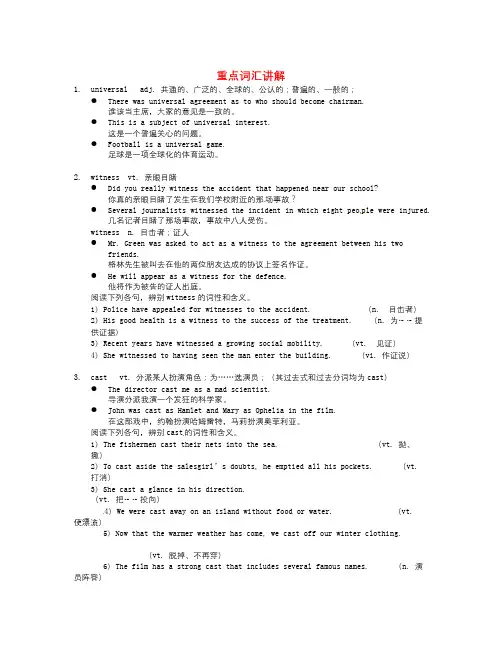
重点词汇讲解1.universal adj. 共通的、广泛的、全球的、公认的;普遍的、一般的;●There was universal agreement as to who should become chairman.谁该当主席,大家的意见是一致的。
●This is a subject of universal interest.这是一个普遍关心的问题。
●Football is a universal game.足球是一项全球化的体育运动。
2.witness vt. 亲眼目睹●Did you really witness the accident that happened near our school?你真的亲眼目睹了发生在我们学校附近的那场事故?●Several journalists witnessed the incident in which eight peo ple were injured.几名记者目睹了那场事故,事故中八人受伤。
witness n. 目击者;证人●Mr. Green was asked to act as a witness to the agreement between his twofriends.格林先生被叫去在他的两位朋友达成的协议上签名作证。
●He will appear as a witness for the defence.他将作为被告的证人出庭。
阅读下列各句,辨别witness的词性和含义。
1) Police have appealed for witnesses to the accident. (n. 目击者)2) His good health is a witness to the success of the treatment. (n. 为……提供证据)3) Recent years have witnessed a growing social mobility. (vt. 见证)4) She witnessed to having seen the man enter the building. (vi. 作证说)3.cast vt. 分派某人扮演角色;为……选演员;(其过去式和过去分词均为cast)●The director cast me as a mad scientist.导演分派我演一个发狂的科学家。
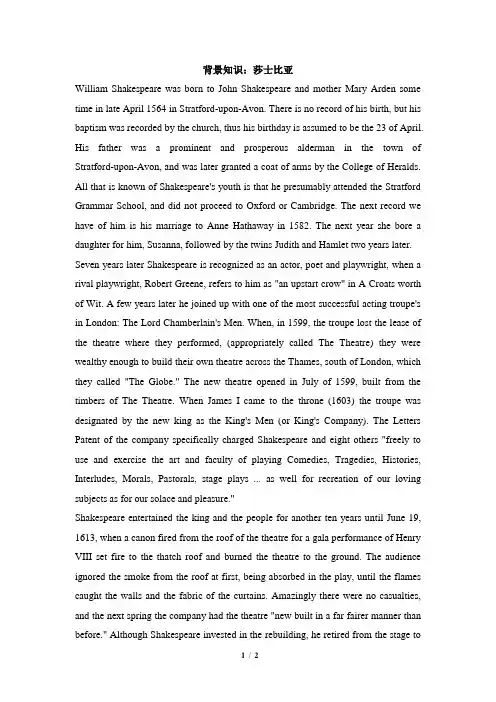
背景知识:莎士比亚William Shakespeare was born to John Shakespeare and mother Mary Arden some time in late April 1564 in Stratford-upon-Avon. There is no record of his birth, but his baptism was recorded by the church, thus his birthday is assumed to be the 23 of April. His father was a prominent and prosperous alderman in the town of Stratford-upon-Avon, and was later granted a coat of arms by the College of Heralds. All that is known of Shakespeare's youth is that he presumably attended the Stratford Grammar School, and did not proceed to Oxford or Cambridge. The next record we have of him is his marriage to Anne Hathaway in 1582. The next year she bore a daughter for him, Susanna, followed by the twins Judith and Hamlet two years later. Seven years later Shakespeare is recognized as an actor, poet and playwright, when a rival playwright, Robert Greene, refers to him as "an upstart crow" in A Croats worth of Wit. A few years later he joined up with one of the most successful acting troupe's in London: The Lord Chamberlain's Men. When, in 1599, the troupe lost the lease of the theatre where they performed, (appropriately called The Theatre) they were wealthy enough to build their own theatre across the Thames, south of London, which they called "The Globe." The new theatre opened in July of 1599, built from the timbers of The Theatre. When James I came to the throne (1603) the troupe was designated by the new king as the King's Men (or King's Company). The Letters Patent of the company specifically charged Shakespeare and eight others "freely to use and exercise the art and faculty of playing Comedies, Tragedies, Histories, Interludes, Morals, Pastorals, stage plays ... as well for recreation of our loving subjects as for our solace and pleasure."Shakespeare entertained the king and the people for another ten years until June 19, 1613, when a canon fired from the roof of the theatre for a gala performance of Henry VIII set fire to the thatch roof and burned the theatre to the ground. The audience ignored the smoke from the roof at first, being absorbed in the play, until the flames caught the walls and the fabric of the curtains. Amazingly there were no casualties, and the next spring the company had the theatre "new built in a far fairer manner than before." Although Shakespeare invested in the rebuilding, he retired from the stage tothe Great House of New Place in Stafford that he had purchased in 1597, and some considerable land holdings, where he continued to write until his death in 1616 on the day of his 52nd birthday.。
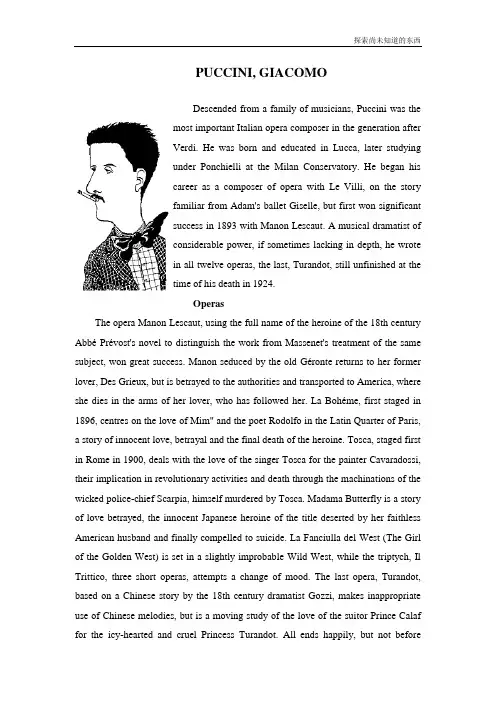
PUCCINI, GIACOMODescended from a family of musicians, Puccini was themost important Italian opera composer in the generation afterVerdi. He was born and educated in Lucca, later studyingunder Ponchielli at the Milan Conservatory. He began hiscareer as a composer of opera with Le Villi, on the storyfamiliar from Adam's ballet Giselle, but first won significantsuccess in 1893 with Manon Lescaut. A musical dramatist ofconsiderable power, if sometimes lacking in depth, he wrotein all twelve operas, the last, Turandot, still unfinished at thetime of his death in 1924.OperasThe opera Manon Lescaut, using the full name of the heroine of the 18th century Abbé Prévost's novel to distinguish the work from Massenet's treatment of the same subject, won great success. Manon seduced by the old Géronte returns to her former lover, Des Grieux, but is betrayed to the authorities and transported to America, where she dies in the arms of her lover, who has followed her. La Bohéme, first staged in 1896, centres on the love of Mim" and the poet Rodolfo in the Latin Quarter of Paris, a story of innocent love, betrayal and the final death of the heroine. Tosca, staged first in Rome in 1900, deals with the love of the singer Tosca for the painter Cavaradossi, their implication in revolutionary activities and death through the machinations of the wicked police-chief Scarpia, himself murdered by Tosca. Madama Butterfly is a story of love betrayed, the innocent Japanese heroine of the title deserted by her faithless American husband and finally compelled to suicide. La Fanciulla del West (The Girl of the Golden West) is set in a slightly improbable Wild West, while the triptych, Il Trittico, three short operas, attempts a change of mood. The last opera, Turandot, based on a Chinese story by the 18th century dramatist Gozzi, makes inappropriate use of Chinese melodies, but is a moving study of the love of the suitor Prince Calaf for the icy-hearted and cruel Princess Turandot. All ends happily, but not beforemoments of suspense, marked by the famous tenor aria Nessun dorma (Let no-one sleep).Chamber MusicSome of the musical material of a particularly poignant moment in Manon Lescaut appears in a set of pieces for string quartet by Puccini, Crisantemi (Chrysanthemums), part of a very small output of instrumental music, little of which was published by the composer.。
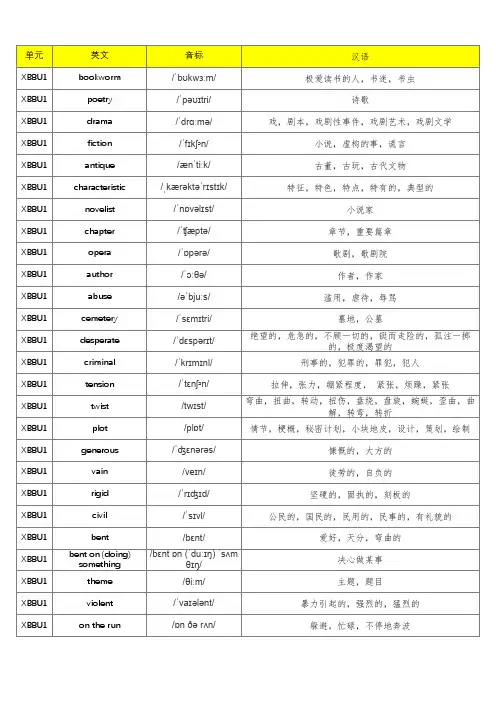
XB8U1painter/ˈpeɪntə/画家,油漆工XB8U1live up to/lɪv ʌp tuː/不辜负,遵守,符合XB8U1workhouse/ˈwɜːkhaʊs/济贫院,贫民习艺所XB8U1millionaire/ˌmɪljəˈneə/百万富翁,巨富XB8U1vice/vaɪs/恶行,缺点XB8U1reform/ˌriːˈfɔːm/改革,改过自新,改造XB8U1threat/θrɛt/威胁,恐吓XB8U1violence/ˈvaɪələns/暴力,暴行XB8U1resist/rɪˈzɪst/抗拒,忍住,抵制,抵抗XB8U1reunite/ˌriːjuːˈnaɪt/再统一,再联合,重聚XB8U1home-made/ˈhəʊmˈmeɪd/自制的,家里做的,国产的XB8U1bind/baɪnd/捆,绑,包扎,装订XB8U1spin/spɪn/旋转,纺XB8U1sneaker/ˈsniːkə/帆布胶底运动鞋XB8U1pin/pɪn/别住,固定,别针,大头针XB8U1worn out/wɔːn aʊt/破旧的,筋疲力尽的XB8U1envelope/ˈɛnvələʊp/信封,封皮XB8U1brand new/brænd njuː/全新的,崭新的XB8U1spit/spɪt/吐XB8U1chest/ʧɛst/胸部,胸膛,箱,大箱子XB8U1attic/ˈætɪk/阁楼,顶楼XB8U1modern-day/ˈmɒdən-deɪ/现代的,当代的XB8U1stepmother/ˈstɛpˌmʌðə/继母XB8U1stepsister/ˈstɛpˌsɪstə/异父姊妹,异母姊妹XB8U1rag/ræɡ/抹布,破布XB8U1Ireland/ˈaɪələnd/爱尔兰XB8U1rescue/ˈrɛskjuː/救援,营救XB8U2jazz/ʤæz/爵士音乐,爵士舞XB8U2string/strɪŋ/细绳,带子,琴弦XB8U2cast/kɑːst/投,扔,抛,撒,掷,投射,选派演员,投票XB8U2butterfly/ˈbʌtəflaɪ/蝴蝶XB8U2awesome/ˈɔːsəm/引起敬畏的,可怕的,极好的,了不起的XB8U2stubborn/ˈstʌbən/倔强的,顽强的,难对付的,棘手的XB8U2princess/prɪnˈsɛs/公主,王妃XB8U2condemn/kənˈdɛm/谴责,指责,宣判有罪,判刑XB8U2be condemned tosomething/biː kənˈdɛmd tuː ˈsʌmθɪŋ/被处以某种刑罚XB8U2dare/deə/敢于,胆敢,敢胆敢,激将,激XB8U2ask for somebody'shand in marriage/ɑːsk fɔː ˈsʌmbədiz hænd ɪn ˈmærɪʤ/求婚XB8U2prince/prɪns/王子,亲王XB8U2disturbing/dɪsˈtɜːbɪŋ/引起烦恼的,令人不安的XB8U2fall in love/fɔːl ɪn lʌv/爱上XB8U2at first sight/æt fɜːst saɪt/一见,乍一看XB8U2unwilling/ʌnˈwɪlɪŋ/不愿意的,勉强的XB8U2seize/siːz/抓住,逮捕,夺取,把握XB8U2demand/dɪˈmɑːnd/要求,需要,需求XB8U2grab/ɡræb/抓住,抓紧,赶紧XB8U2evident/ˈɛvɪdənt/明显的,清楚的,明白的XB8U2scold/skəʊld/责骂,斥责XB8U2merciful/ˈmɜːsɪfʊl/仁慈的,宽大的XB8U2dawn/dɔːn/黎明,拂晓,开端,起始XB8U2deadline/ˈdɛdlaɪn/最后期限,截止日期XB8U2unite/juːˈnaɪt/联合,团结,合并XB8U2grand/ɡrænd/雄伟的,盛大的,豪华的,华丽的,重大的,主要的,最高的XB8U2broken/ˈbrəʊkən/破碎的,损坏的,折断的,不完整的,不流利的XB8U2broken heart/ˈbrəʊkən hɑːt/破碎的心,哀恸XB8U2opportunity/ˌɒpəˈtjuːnɪti/机会,时机XB8U2unemployment/ˌʌnɪmˈplɔɪmənt/失业,失业人数,失业率XB8U2personnel/ˌpɜːsəˈnɛl/全体人员,人事部,人事科XB8U2department/dɪˈpɑːtmənt/部,司,局,部门,系XB8U2personnel department /ˌpɜːsəˈnɛl dɪˈpɑːtmənt/人事部门XB8U2chorus/ˈkɔːrəs/合唱,齐声说,合唱队,齐声XB8U2sore/sɔː/疼痛的,酸痛的XB8U2throat/θrəʊt/喉咙,咽喉,喉头XB8U2composer/kəmˈpəʊzə/作曲家XB8U2motherland/ˈmʌðəlænd/祖国XB8U2Austria/ˈɒstrɪə/奥地利XB8U2tutor/ˈtjuːtə/家庭教师,导师,辅导教师XB8U2symphony/ˈsɪmfəni/交响乐,交响曲XB8U2bachelor/ˈbæʧələ/学士,未婚男子,单身汉XB8U2flute/fluːt/长笛XB8U2kindergarten/ˈkɪndəˌɡɑːtn/幼儿园XB8U2folk/fəʊk/人们,民间音乐,民间的XB8U2ballet/ˈbæleɪ/芭蕾舞,芭蕾舞剧,芭蕾舞乐曲XB8U2swan/swɒn/天鹅XB8U2album/ˈælbəm/相册,集邮册,唱片专辑,签名簿,粘贴簿XB8U2collection/kəˈlɛkʃᵊn/收藏品,收集物XB8U2chart/ʧɑːt/绘制地图,图,图表,航海图XB8U2the charts/ðə ʧɑːts/每周流行唱片排行榜XB8U2blues/bluːz/布鲁斯音乐,蓝调XB8U2root/ruːt/根,根茎,词根,根源XB8U2slavery/ˈsleɪvəri/奴隶制度,奴隶身份XB8U3acute/əˈkjuːt/敏锐的,灵敏的,剧烈的,强烈的,严重的,急性的XB8U3acute angle/əˈkjuːt ˈæŋɡl/锐角XB8U3cube/kjuːb/立方体,立方形XB8U3rectangle/ˈrɛkˌtæŋɡl/矩形,长方形XB8U3consensus/kənˈsɛnsəs/一致,共识XB8U3calculate/ˈkælkjʊleɪt/计算,核算,预测,估计XB8U3helicopter/ˈhɛlɪkɒptə/直升机XB8U3tank/tæŋk/大容器,箱,槽,坦克XB8U3impressionism/ɪmˈprɛʃnɪzm/印象主义,印象派XB8U3shadow/ˈʃædəʊ/影子,阴影, 背光处,阴暗处XB8U3water lily/ˈwɔːtə ˈlɪli/睡莲XB8U3pond/pɒnd/池塘XB8U3ImpressionistMovement/ɪmˈprɛʃᵊnɪst ˈmuːvmənt/印象主义运动XB8U3oil painting/ɔɪl ˈpeɪntɪŋ/油画XB8U3starry/ˈstɑːri/布满星星的,像星星的,明亮的XB8U3commit/kəˈmɪt/犯,承担义务,作出保证,投放,使用XB8U3being/ˈbiːɪŋ/生物,人,存在,生存XB8U3reward/rɪˈwɔːd/报答,报酬,奖赏, 悬赏金,赏金, 报答,酬劳XB8U3agent/ˈeɪʤənt/代理人,代理商,经纪人XB8U3franc/fræŋk/法郎XB8U3upwards of/ˈʌpwədz ɒv/以上,大于,超过XB8U3be off to/biː ɒf tuː/动身去XB8U3gallery/ˈɡæləri/画廊,美术陈列室,美术馆,长廊,门廊,走廊XB8U3changeable/ˈʧeɪnʤəbᵊl/多变的,喜怒无常的XB8U3ankle/ˈæŋkl/踝,脚踝,踝骨XB8U3suite/swiːt/家具,套房,一套物件XB8U3accommodation/əˌkɒməˈdeɪʃᵊn/住处,住宿,工作场所XB8U3dormitory/ˈdɔːmɪtri/寝室,宿舍XB8U3canal/kəˈnæl/运河,沟渠,水道XB8U3passer-by/ˈpɑːsə-baɪ/过路人XB8U3souvenir/ˈsuːvənɪə/纪念品,纪念物XB8U3admission/ədˈmɪʃᵊn/接纳,进入权,准许入会,准许入学,承认,供认,入场费XB8U3scenery/ˈsiːnəri/风景,景色XB8U3scholarship/ˈskɒləʃɪp/奖学金XB8U3cloth/klɒθ/布,织物,衣料,桌布XB8U3slice/slaɪs/薄片,切片,份,部分XB8U3apron/ˈeɪprən/围裙XB8U3chef/ʃɛf/主厨,厨师,厨师长XB8U3seaweed/ˈsiːwiːd/海草,海藻XB8U3cut up/kʌt ʌp/切碎,割碎,剪碎XB8U3onion/ˈʌnjən/洋葱,葱头XB8U3pineapple/ˈpaɪnˌæpl/凤梨,菠萝XB8U3eggplant/ˈɛɡˌplɑːnt/茄子XB8U3seashell/ˈsiːˌʃɛl/海贝壳XB8U3lay out/leɪ aʊt/布置,设计,铺开,展开XB8U3pillow/ˈpɪləʊ/枕头XB8U3disgusting/dɪsˈɡʌstɪŋ/令人作呕的,厌恶的XB8U3aluminium/ˌæljəˈmɪniəm/铝XB8U3spray/spreɪ/水花,浪花,向...喷射XB8U3paintbrush/ˈpeɪntbrʌʃ/画笔XB8U3tin/tɪn/锡,罐头,听XB8U3dip/dɪp/浸一浸,浸水XB8U3wrinkle/ˈrɪŋkl/皱纹,起皱纹,皱起XB8U3cut something out (ofsomething)/kʌt ˈsʌmθɪŋ aʊt (ɒvˈsʌmθɪŋ)/剪出,剪下XB8U4tiresome/ˈtaɪəsəm/令人厌倦的,讨厌的XB8U4script/skrɪpt/剧本,手稿XB8U4shoot/ʃuːt/嫩枝,新芽,射击,拍摄,射门,投篮,快速移动XB8U4sincere/sɪnˈsɪə/真诚的,诚挚的,诚恳的XB8U4congratulation/kənˌɡrætjʊˈleɪʃᵊn/祝贺,庆贺XB8U4screenwriter/ˈskriːnˌraɪtə/编剧,剧作家XB8U4full-length/ˈfʊlˈlɛŋθ/足本的,全身的XB8U4robbery/ˈrɒbəri/抢劫,盗窃XB8U4anecdote/ˈænɪkdəʊt/轶事,奇闻XB8U4biography/baɪˈɒɡrəfi/传记XB8U4accumulate/əˈkjuːmjʊleɪt/积聚,堆积,积累XB8U4popcorn/ˈpɒpkɔːn/爆玉米花XB8U4salty/ˈsɔːlti/咸的,含盐的XB8U4tense/tɛns/绷紧的,紧张的,担心的,令人紧张的XB8U4thriller/ˈθrɪlə/惊险小说,惊险电影,恐怖小说,恐怖电影XB8U4paramount/ˈpærəmaʊnt/至为重要的,首要的,至高无上的,权力最大的XB8U4touchstone/ˈtʌʧstəʊn/试金石,检验标准XB8U4conquer/ˈkɒŋkə/征服,击败,克服,破除XB8U4concubine/ˈkɒŋkjʊbaɪn/妾,姨太太XB8U4lantern/ˈlæntən/提灯,灯笼XB8U4philosopher/fɪˈlɒsəfə/哲学家,思想家XB8U4fantasy/ˈfæntəsi/幻想,想象,幻想作品XB8U4scar/skɑː/伤痕,疤痕XB8U4forehead/ˈfɒrɪd/额,前部XB8U4wizard/ˈwɪzəd/巫师,能手,奇才XB8U4witch/wɪʧ/女巫,巫婆XB8U4evil/ˈiːvl/坏的,罪恶的,邪恶,罪恶XB8U4institution/ˌɪnstɪˈtjuːʃᵊn/机构,团体XB8U4parallel/ˈpærəlɛl/平行的,平行线,平行面,平行物XB8U4curriculum/kəˈrɪkjʊləm/全部课程,课程XB8U4contradictory/ˌkɒntrəˈdɪktəri/相矛盾的,引起抵触的XB8U4partner/ˈpɑːtnə/伙伴,搭档XB8U4fierce/fɪəs/凶猛的,猛烈的,激烈的XB8U4zoom/zuːm/飞驰,急速上升XB8U4broom/brʊm/扫帚XB8U4dizzy/ˈdɪzi/头晕目眩的,被弄糊涂的XB8U4attraction/əˈtrækʃᵊn/吸引,吸引力,有吸引力的事,有吸引力的人XB8U4show off/ʃəʊ ɒf/卖弄,炫耀XB8U4disappoint/ˌdɪsəˈpɔɪnt/使失望XB8U4give thought to/ɡɪv θɔːt tuː/认真考虑,思考。
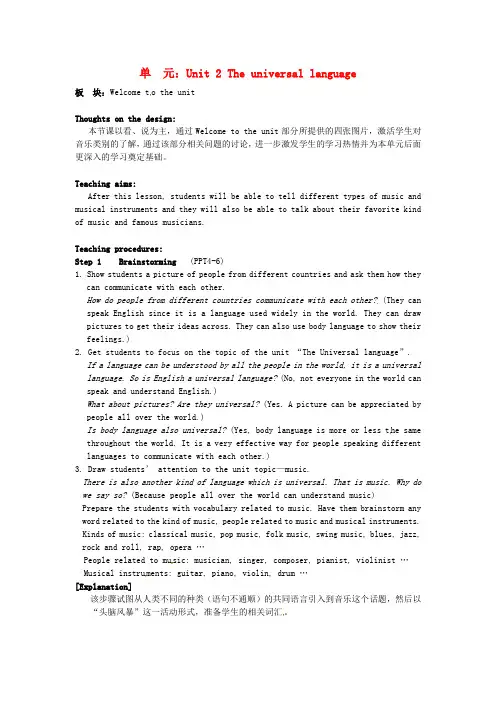
单元:Unit 2 The universal language板块:Welcome t o the unitThoughts on the design:本节课以看、说为主,通过Welcome to the unit部分所提供的四张图片,激活学生对音乐类别的了解,通过该部分相关问题的讨论,进一步激发学生的学习热情并为本单元后面更深入的学习奠定基础。
Teaching aims:After this lesson, students will be able to tell different types of music and musical instruments and they will also be able to talk about their favorite kind of music and famous musicians.Teaching procedures:Step 1 Brainstorming (PPT4-6)1. Show students a picture of people from different countries and ask them how theycan communicate with each other.How do people from different countries communicate with each other? (They can speak English since it is a language used widely in the world. They can draw pictures to get their ideas across. They can also use body language to show their feelings.)2. Get students to focus on the topic of the unit “The Universal language”.If a language can be understood by all the people in the world, it is a universal language. So is English a universal language?(No, not everyone in the world can speak and understand English.)What about pictures? Are they universal? (Yes. A picture can be appreciated by people all over the world.)Is body language also universal? (Yes, body language is more or less t he same throughout the world. It is a very effective way for people speaking different languages to communicate with each other.)3. Draw students’ attention to the unit topic—music.There is also another kind of language which is universal. That is music. Why do we say so? (Because people all over the world can understand music)Prepare the students with vocabulary related to music. Have them brainstorm any word related to the kind of music, people related to music and musical instruments. Kinds of music: classical music, pop music, folk music, swing music, blues, jazz, rock and roll, rap, opera …People related to mu sic: musician, singer, composer, pianist, violinist …Musical instru ments: guitar, piano, violin, drum …[Explanation]该步骤试图从人类不同的种类(语句不通顺)的共同语言引入到音乐这个话题,然后以“头脑风暴”这一活动形式,准备学生的相关词汇。
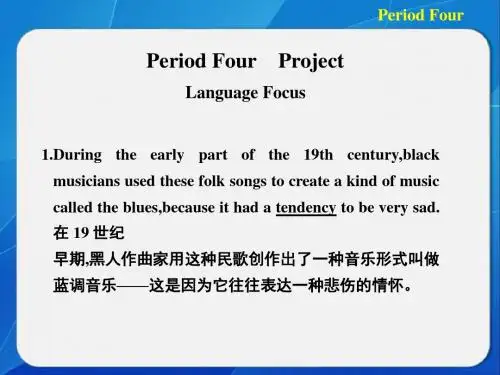
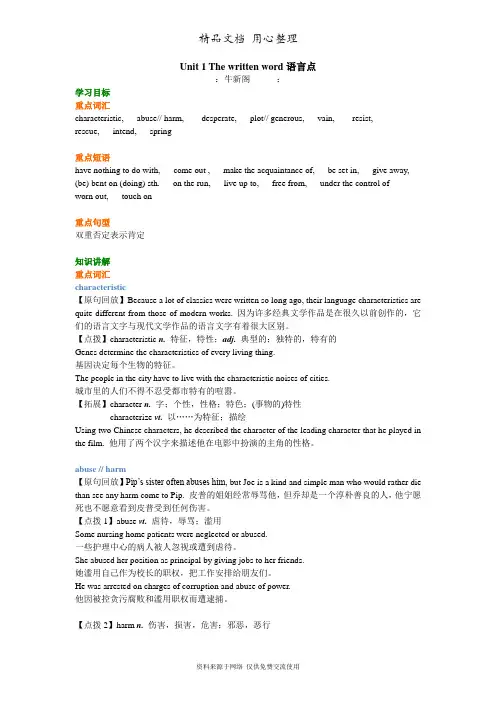
Unit 1 The written word语言点:牛新阁:学习目标重点词汇characteristic, abuse// harm, desperate, plot// generous, vain, resist,rescue, intend, spring重点短语have nothing to do with, come out , make the acquaintance of, be set in, give away, (be) bent on (doing) sth. on the run, live up to, free from, under the control ofworn out, touch on重点句型双重否定表示肯定知识讲解重点词汇characteristic【原句回放】Because a lot of classics were written so long ago, their language characteristics are quite different from those of modern works. 因为许多经典文学作品是在很久以前创作的,它们的语言文字与现代文学作品的语言文字有着很大区别。
【点拨】characteristic n. 特征,特性;adj. 典型的;独特的,特有的Genes determine the characteristics of every living thing.基因决定每个生物的特征。
The people in the city have to live with the characteristic noises of cities.城市里的人们不得不忍受都市特有的喧嚣。
【拓展】character n.字;个性,性格;特色;(事物的)特性characterize vt.以……为特征;描绘Using two Chinese characters, he described the character of the leading character that he played in the film. 他用了两个汉字来描述他在电影中扮演的主角的性格。
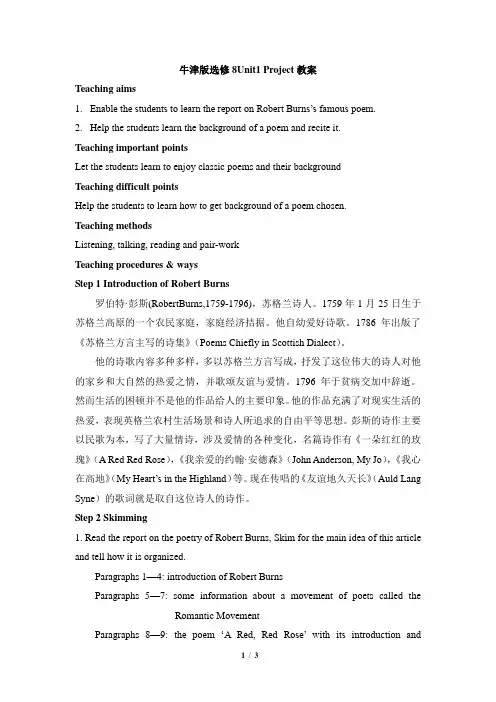
牛津版选修8Unit1 Project教案Teaching aims1.Enable the students to learn the report on Robert Burns’s famous poem.2.Help the students learn the background of a poem and recite it.Teaching important pointsLet the students learn to enjoy classic poems and their backgroundTeaching difficult pointsHelp the students to learn how to get background of a poem chosen.Teaching methodsListening, talking, reading and pair-workTeaching procedures & waysStep 1 Introduction of Robert Burns罗伯特·彭斯(RobertBurns,1759-1796),苏格兰诗人。
1759年1月25日生于苏格兰高原的一个农民家庭,家庭经济拮据。
他自幼爱好诗歌。
1786年出版了《苏格兰方言主写的诗集》(Poems Chiefly in Scottish Dialect)。
他的诗歌内容多种多样,多以苏格兰方言写成,抒发了这位伟大的诗人对他的家乡和大自然的热爱之情,并歌颂友谊与爱情。
1796年于贫病交加中辞逝。
然而生活的困顿并不是他的作品给人的主要印象。
他的作品充满了对现实生活的热爱,表现英格兰农村生活场景和诗人所追求的自由平等思想。
彭斯的诗作主要以民歌为本,写了大量情诗,涉及爱情的各种变化,名篇诗作有《一朵红红的玫瑰》(A Red Red Rose),《我亲爱的约翰·安德森》(John Anderson, My Jo),《我心在高地》(My Heart’s in the Highland)等。
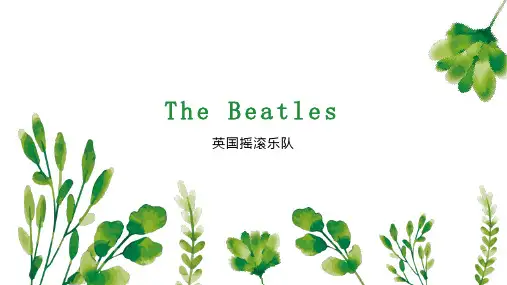
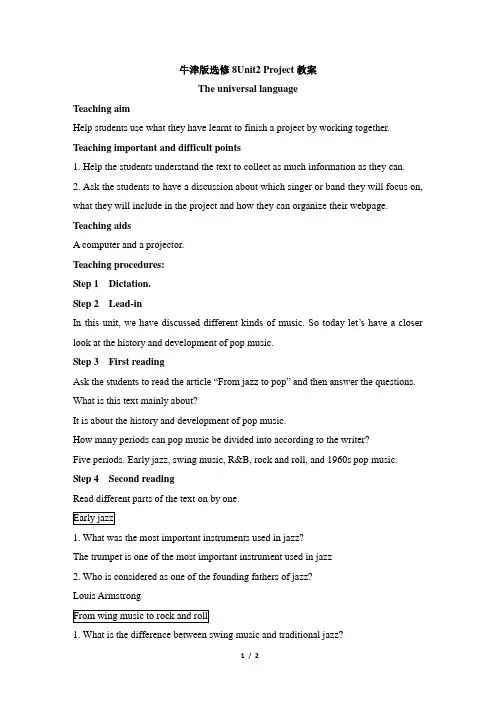
牛津版选修8Unit2 Project教案The universal languageTeaching aimHelp students use what they have learnt to finish a project by working together. Teaching important and difficult points1. Help the students understand the text to collect as much information as they can.2. Ask the students to have a discussion about which singer or band they will focus on, what they will include in the project and how they can organize their webpage. Teaching aidsA computer and a projector.Teaching procedures:Step 1 Dictation.Step 2 Lead-inIn this unit, we have discussed different kinds of music. So today let’s have a closer look at the history and development of pop music.Step 3 First readingAsk the students to read the article “From jazz to pop” and then answer the qu estions. What is this text mainly about?It is about the history and development of pop music.How many periods can pop music be divided into according to the writer?Five periods. Early jazz, swing music, R&B, rock and roll, and 1960s pop music. Step 4 Second readingRead different parts of the text on by one.1. What was the most important instruments used in jazz?The trumpet is one of the most important instrument used in jazz2. Who is considered as one of the founding fathers of jazz?Louis Armstrong1. What is the difference between swing music and traditional jazz?Swing music is faster than traditional jazz and have a sort of swinging feel to the music.2. What are included in “big bands”?Big bands included a pianist a violinist and a bassist, as well as others.3. Who is considered as one of the pioneers of rock and roll?Big Joe Turner.1. Which band was the most successful rock and roll band of the 1960s?The Beatles.2. What is “Beatlemania”?The phenomenon that masses of fans of the Beatles welcome this band at the airport. Step 5 Finish exercises B1 and B2 on the page 109Step 6 Discussion.Work in groups to discuss how to research and what to research about a singer or a band and then answer the questions in part B.Step 7 HomeworkEach group should choose a singer or a band to research and then divide the work among group members. Each group member will be responsible for searching for some information. Use the information collected to make a webpage after class and present them to the class on the display wall.。
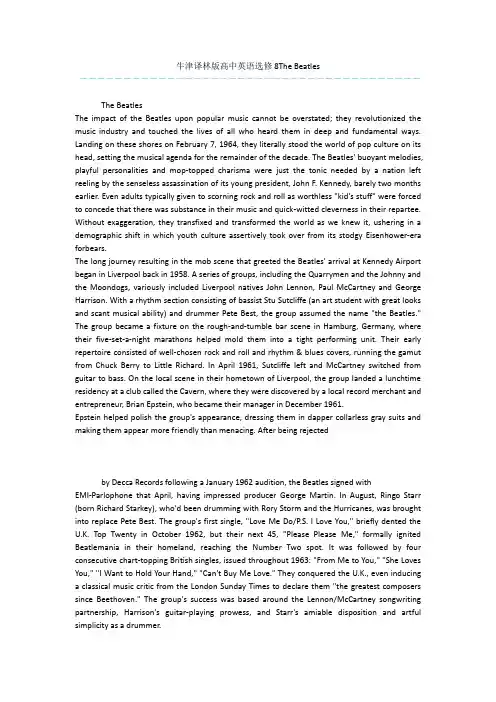
牛津译林版高中英语选修8The Beatles---------------------------------------The BeatlesThe impact of the Beatles upon popular music cannot be overstated; they revolutionized the music industry and touched the lives of all who heard them in deep and fundamental ways. Landing on these shores on February 7, 1964, they literally stood the world of pop culture on its head, setting the musical agenda for the remainder of the decade. The Beatles' buoyant melodies, playful personalities and mop-topped charisma were just the tonic needed by a nation left reeling by the senseless assassination of its young president, John F. Kennedy, barely two months earlier. Even adults typically given to scorning rock and roll as worthless "kid's stuff" were forced to concede that there was substance in their music and quick-witted cleverness in their repartee. Without exaggeration, they transfixed and transformed the world as we knew it, ushering in a demographic shift in which youth culture assertively took over from its stodgy Eisenhower-era forbears.The long journey resulting in the mob scene that greeted the Beatles' arrival at Kennedy Airport began in Liverpool back in 1958. A series of groups, including the Quarrymen and the Johnny and the Moondogs, variously included Liverpool natives John Lennon, Paul McCartney and George Harrison. With a rhythm section consisting of bassist Stu Sutcliffe (an art student with great looks and scant musical ability) and drummer Pete Best, the group assumed the name "the Beatles." The group became a fixture on the rough-and-tumble bar scene in Hamburg, Germany, where their five-set-a-night marathons helped mold them into a tight performing unit. Their early repertoire consisted of well-chosen rock and roll and rhythm & blues covers, running the gamut from Chuck Berry to Little Richard. In April 1961, Sutcliffe left and McCartney switched from guitar to bass. On the local scene in their hometown of Liverpool, the group landed a lunchtime residency at a club called the Cavern, where they were discovered by a local record merchant and entrepreneur, Brian Epstein, who became their manager in December 1961.Epstein helped polish the group's appearance, dressing them in dapper collarless gray suits and making them appear more friendly than menacing. After being rejectedby Decca Records following a January 1962 audition, the Beatles signed withEMI-Parlophone that April, having impressed producer George Martin. In August, Ringo Starr (born Richard Starkey), who'd been drumming with Rory Storm and the Hurricanes, was brought into replace Pete Best. The group's first single, "Love Me Do/P.S. I Love You," briefly dented the U.K. Top Twenty in October 1962, but their next 45, "Please Please Me," formally ignited Beatlemania in their homeland, reaching the Number Two spot. It was followed by four consecutive chart-topping British singles, issued throughout 1963: "From Me to You," "She Loves You," "I Want to Hold Your Hand," "Can't Buy Me Love." They conquered the U.K., even inducing a classical music critic from the London Sunday Times to declare them "the greatest composers since Beethoven." The group's success was based around the Lennon/McCartney songwriting partnership, Harrison's guitar-playing prowess, and Starr's amiable disposition and artful simplicity as a drummer.The Beatles' conquest of America early in 1964 launched the British Invasion, as a torrent of rock and roll bands from Britain overtook the pop charts. The Fab Four's first Number One single in the U.S. was "I Want to Hold Your Hand," released on Capitol Records, EMI's American counterpart. This exuberant track was followed by 45 more Top Forty hits over the next half-dozen years. During the week of April 4, 1964, the Beatles set a record that is likely never to be broken when they occupied all five of the top positions on Billboard's Top Pop Singles chart, with "Can't Buy Me Love" ensconced at Number One. Their popularity soared still further with the release of their playfully anarchic documentary film, A Hard Day's Night, in August 1964. When all was said and done, the Beatles charted 20 Number One singles in the States - a number even greater than runner-up Elvis Presley's 17 chart-toppers. For such feats of sales and airplay alone, the Beatles can unassailably be regarded as the top group in rock and roll history. Yet their significance as a band extends beyond numbers to encompass their innovations in the recording studio. The Beatles' legacy as a concert attraction, during their harried passage from nightclubs to baseball stadiums, is distinguished primarily by the deafening screams of female fans overcome by the group's very appearance. Consequently, the Beatles began to indulgetheir creative energies in the studio, layering sounds and crafting songs in a way no one had attempted before. The results included such musically expansive and lyrically sophisticated albums as Rubber Soul (1965) and Revolver (1966). For various reasons, ranging from safety concerns to frustration that no one could hear or was listening, the Beatles retired from touring after a San Francisco concert on August 29, 1966.Ten months later, they released Sgt. Pepper's Lonely Hearts Club Band, an album that has almost universally been cited as the creative apotheosis of rock and roll, a watershed event in which rock became "serious art" without losing its sense of humor (or sense of the absurd). Realizing the band members' collective ambitions took four months and all the technical wiles of producer George Martin. A completely self-contained album meant to be played and experienced from start to finish, Sgt. Pepper broke the mold in that no singles were released from it. The album's heady artistic reach further cemented the notion of a viable counterculture in the minds of youthful dropouts everywhere. Anyone who was alive in the summer of 1967 can remember the pleasant shock of hearing it and the reverberations it sent outward into the world of rock and roll and beyond.In the wake of Sgt. Pepper, the Beatles began to splinter in ways that were, at first, subtle but that gradually grew more pronounced. Subsequent events included the death of manager Epstein due to an overdose of sleeping pills; the release of the TV film Magical Mystery Tour, which earned the Beatles some of their first negative reviews; a trip to India to meditate with Maharishi Mahesh Yogi, about whom Lennon wrote the scabrous putdown "Sexy Sadie"; and the launching in January 1968 of Apple Corps, Ltd., a disastrously mismanaged entertainment empire that helped bring down the Beatles amid a tangled maze of money matters.Through all the chaotic events of the late Sixties, the Beatles managed to retain their integrity and focus as recording artists. Released in August 1968, the single "Hey Jude"/"Revolution" became their most popular single. The Beatles (1968), adouble-LP popularly referred to as "the White Album," was like a prism that found the grouprefracting into four individual and highly estimable talents. The album and film Let It Be, recorded in 1969 but shelved until 1970, essentially documented theBeatles' dissolution and breakup amid internal squabbles and the presence of John Lennon's new mate, Yoko Ono. Yet the Beatles came together and exited on a high note, uniting in the summer of 1969 to record their swan song, Abbey Road.On April 10, 1970, Paul McCartney announced his departure from the Beatles, and the group quietly came to an end. Throughout the Seventies, fans hoped for an eventual reunion, while the group members pursued solo careers with varying degrees of artistic and commercial success. Those hopes were forever dashed by the murder of John Lennon in New York City on December 8, 1980.July 7, 1940Ringo Starr was born.October 9, 1940John Lennon is born at Oxford Street Maternity Hospital in Liverpool, England, to Julia Stanley and Alfred Lennon.June 18, 1942James Paul McCartney is born in Liverpool, England.February 25, 1943George Harrison was born.1956Julia, John Lennon's mother, bought him his first guitar through a mail order ad. His incessant playing prompts John's Aunt Mimi to say, "The guitar's all very well as a hobby, John, but you'll never make a living out of it." John forms his first group, the Quarrymen.July 6, 1957John Lennon meets Paul McCartney at the Woolton Parish Church in Liverpool during a performance by John's group the Quarrymen. Impressed by Paul's ability to tune a guitar and by his knowledge of song lyrics, John asks him to join the group.Paul McCartney introduces George Harrison to the Quarrymen at a basement teen club called the Morgue. George joins the group.August 1, 1960The Beatles make their debut in Hamburg, West Germany, with Stu Sutcliffe on bass and Pete Best on drums.January 1, 1961The Beatles make their debut at the Cavern Club in Liverpool.November 1, 1961Local record store manager Brian Epstein is introduced to the Beatles. He soon signs a contract to manage them.March 7, 1962The Beatles make their radio debut performing three songs, including Roy Orbison's "Dream Baby," on the BBC.April 10, 1962Stu Sutcliffe dies of a brain hemorrhage.June 1, 1962The Beatles audition for George Martin at Parlophone/EMI Records. He agrees to sign the group, but insists that Pete Best be replaced. Within months, Richard "Ringo" Starkey joins the group. SEPTEMBER 4-11, 1962The Beatles record their first sessions at EMI Studios in London, with George Martin as producer. December 1, 1963"I Want to Hold Your Hand,"the Beatles' first American single, is released by Capitol Records. January 26, 1964I Want To Hold Your Hand (The Beatles) was a hit.February 7, 1964The Beatles arrive in AmericaThe Beatles make their first appearance on 'The Ed Sullivan Show'.February 11, 1964The Beatles begin their first U.S. tour at the Coliseum in Washington, D.C.March 15, 1964She Loves You (The Beatles) was a hit.March 29, 1964Can't Buy Me Love (The Beatles) was a hit.April 4, 1964The top five slots on the 'Billboard' chart are held by the Beatles, a feat never before or since matched.May 24, 1964Love Me Do (The Beatles) was a hit.July 6, 1964The world premiere of The Beatles' 'A Hard Day's Night' takes place in London. July 26, 1964A Hard Day's Night (The Beatles) was a hit.August 14, 1964The Beatles cut Little Willie John's "Leave My Kitten Alone" at EMI Studios in London. Intended for album 'Beatles For Sale' ('Beatles '65' in the US), it was left off and remained unreleased until 'Anthology 1' in 1995.1964The Beatles release "This Boy" from their first American album 'Meet the Beatles'. December 20, 1964I Feel Fine (The Beatles) was a hit.March 7, 1965Eight Days a Week (The Beatles) was a hit.1965The Beatles release "Yes It Is".April 1, 1965John Lennon composes "Help!" the title song for the Beatles' second film. He later confides that the lyrics are a cry for help and a clue to the confusion and despondency he feels.May 16, 1965Ticket to Ride (The Beatles) was a hit.July 29, 1965The Beatles release their second film, 'Help!'.August 15, 1965The Beatles play in front of almost 60,000 fans at Shea Stadium in New York City. August 27, 1965 The Beatles spend the evening talking and playing music with Elvis Presley at his Bel air home. August 29, 1965Help! (The Beatles) was a hit.October 3, 1965Yesterday (The Beatles) was a hit.October 9, 1965The Beatles reach #1 with "Yesterday".October 26, 1965The Beatles are awarded England's prestigious MBE (Members of the Order of the British Empire). John comments, "I thought you had to drive tanks and win wars to get the MBE."January 2, 1966We Can Work It Out (The Beatles) was a hit.March 1, 1966London's 'Evening Standard' publishes an interview with John Lennon in which he states that the Beatles are "more popular than Jesus now." The comment provokes several protests, including the burning of Beatles records.June 19, 1966July 31, 1966John Lennon's comments on the state of Christianity ?made in March, but only lately picked up in the U.S. - spark protests and record burnings on the eve of the Beatles' 1966 American tour. August 29, 1966After their concert at San Francisco's Candlestick Park, the Beatles declare this to be their final concert tour.SEPTEMBER/OCTOBER 1966John Lennon makes his first appearance away from the Beatles in the role of Private Gripweed in Richard Lester's film 'How I Won the War'. He writes "Strawberry Fields Forever" during the filming.March 12, 1967Penny Lane (The Beatles) was a hit.March 18, 1967The Beatles reach #1 with "Penny Lane".June 1, 1967'Sgt. Pepper's Lonely Hearts Club Band' is released in Britain.August 1, 1967Beatle George Harrison and his wife, Patti, stroll through the streets ofHaight-Ashbury, bringing more international attention to the scene.August 13, 1967All You Need Is Love (The Beatles) was a hit.August 19, 1967The Beatles reach #1 with "All You Need Is Love".September 1, 1967John Lennon writes "I Am the Walrus" while under the influence of LSD. He also anonymously sponsors Yoko Ono's Half a Wind Show (subtitled Yoko Plus Me) at London's Lisson Gallery. December 24, 1967December 30, 1967The Beatles reach #1 with "Hello Goodbye".February 15, 1968The Beatles depart for Rishikesh, India, for an advanced course in transcendental meditation. May 1, 1968Apple Corps, Ltd. begins operating in London. It is the Beatles' attempt to take control of their own creative and economic destiny. Later that month, John invites Yoko to his house in Weybridge. They make experimental tapes all night. September 22, 1968Hey Jude (The Beatles) was a hit.September 28, 1968The Beatles reach #1 with "Hey Jude".January 30, 1969The Beatles make their last performance as a group on the roof of the Apple building during the filming of 'Let It Be'.May 18, 1969Get Back (The Beatles) was a hit.May 24, 1969The Beatles reach #1 with "Get Back".November 23, 1969Come Together (The Beatles) was a hit.November 29, 1969The Beatles reach #1 with "Come Together".April 5, 1970Let It Be (The Beatles) was a hit.April 10, 1970Paul McCartney announces that he is leaving the Beatles due to "personal, business and musical differences."June 7, 1970The Long and Winding Road (The Beatles) was a hit.January 2, 1975John and Yoko are reunited. The Beatles' final dissolution takes place in London. December 8, 1980John Lennon is shot by a deranged assailant as he and Yoko return to the Dakota after a recording session. He is pronounced dead at Roosevelt Hospital.1988The Beatles inducted into the Rock and Roll Hall of Fame.November 19, 1995"Free as a Bird," the first new Beatles single in 25 years, is premiered on the televised Beatles Anthology. The song, a 1977 demo by John Lennon completed in 1995 by the three surviving Beatles, reaches #6 on the singles chart in early 1996.March 23, 1996"Real Love," a 1979 John Lennon demo finished in 1995 by the other Beatles, becomes the second new Beatles single to chart in less than three months. Released as part of 'The Beatles Anthology' recordings and TV special, it reaches #11 ?not bad for a band that broke up in 1970. November 29, 2001George Harrison dies at the age of 58 after a long battle with cancer.感谢阅读,欢迎大家下载使用!。
牛津译林版高中英语选修八Model 8Words Study for Unit 1Welcome & Reading1. classic 传统的;典型的;有权威的n. 名著,经典著作课文句:What is classic literature? Classics are the antiques of the literary.什么是经典文学?经典文学作品是文学世界的珍贵遗产。
e.g. the classics of Marxism-Leninism马列主义经典著作Her daughter is particulary likes reading the classics of English literature.她女儿特别喜欢读英国古典文学名著。
classical adj.古典的, 正统派的, 古典文学的classify vt.分类, 分等☆2. received adj. 公认的; 被承认的,被认可的= be recoganized by; be welcomed by课文句:They are novels, plays and poems that were written a long time ago and were so well Written and well received that people still read them today.它们很久以前创作的小说、戏剧和诗歌,写得好,很受欢迎、直至今日人们仍然在阅读这些作品。
e.g. His speech was very well received.The book was well received by middle students.3. wisdom n. 智慧; 学识; 明智课文句:They are examples of great writing and wisdom, and even those written encturies ago can still be found in bookshops and libraries today.经典文学是杰出的创作及智慧的典范,即使是几年前写的那些作品,现在依然可以在书店和图书馆里找到。
Period Four Project基础落实Ⅰ.课文明白得is the right order of the music mentioned in the text?→jazz→R&B→rock and roll→pop music.→blues→R&B→rock and roll→pop music.&B→jazz→blues→rock and roll→pop music.→R&B→rock and roll→jazz→pop music.is one of the first rock and roll musicians?Armstrong. Philips.Joe Turner. Presley.of the following statements is TRUE?Big Joe Turner released the first rock and roll song,he became very famous in America. Presley wrote many songs and played them.Beatles existed for more than 20 years.Philips made Elvis Presley famous in order to make money.Ⅱ.单词检测起源,起因________奴隶身份________偏向,偏好________形式________自由________衰落________趋势,动向________成见________歧视试图;寻觅________尖叫;咆哮慢慢的Ⅲ.短语检测a ________ look at简要阅读________随着……起舞________突然兴起,迅速显现thought ________ as被看成……discrimination种族歧视________疯狂________解散;破碎close ________接近Ⅳ.语境填词has been a gradual ________ (下降) in the population of the town.youth like to follow the latest ________ (潮流) in fashion.have a ________ (偏向) to talk too much when I’m nervous.is still ________ (歧视) against the black people there.had to endure six months’ loss of __________ (自由).covered her mouth to stop her from ________ (尖叫).from the disease is very ____________ (慢慢的).decision was based on ignorance and ________ (成见).Ⅴ.单项填空1.—My old tire you ______ it with a new one?—Certainly,wait a minute,please.the place ofplace place ofhave never sought________my hope you will not misunderstand me.hidebe hidden3.—I’m surprised to hear that Sue and Paul have ________.—So am seemed very happy together when I last saw them.up upup upapplication was ________ by the postal strike.up onoff out______ to have lunch with her friend,saying that she wasn’t feeling well.is ________ as a possible director.ofof oflike her,________ she can be annoying at times.if thoughis a growing ________ earlier retirement.towards towardsfor for________ him on the head with her umbrella.10.—Andrew won’t like it,you know.—______?I don’t care what Andrew thinks!what wherewhy how能力提升阅读明白得As part of the celebrations for Johnny Mercer’s hundredth anniversary,the BBC Concert Orchestra organized the performance of his final stage musical,The Good Companions,at the Watford Colosseum.The Good Companions is based on JB Priestley’s most popular tells of an upper-middle class woman,Elizabeth Trant,who—quite against the advice of her relatives—decides to use her new-found wealth to fund a group of strolling players whose director has run off with all the finds her true self in the theatre,while the enterprise also helps the working-class Jess Oakroyd,to get out of his mundane(一般的) existence and instead work as a handyman(勤杂工) for the similarly unhappy Inigo Jollifant,who is a teacher at a rundown private school,becomes the music hall group’s pianist and becomes famous as a hit songwriter.Andre Previn was an experienced Hollywood composer and ,meanwhile,received nineteen Academy Award nominations,and was the lyricist of scores of American standards.It’s hard to know who deserves the most praise out of the cast,because they were very well chosen,both vocally and as Talbot inhabited the role of Jess Oakroyd with charm and sympathy,and he maintained his Yorkshire accent throughout the delivery of his superb Liz Robertson was perfect as Miss managed to show the many sides of the Meadows also shone as Inigo play the teacher-turned-composer is no mean feat since Jollifant has to play the piano while singing at several points,but for the multitalented Meadows—former member and musical director of The S w ingle Singers—there seemed to be no problem.So one couldn’t have hoped for a better team,and The Good Companions is indeed a witty and engaging piece.is the theme of the story?. .. .does the author think of the performance of the opera?so-so. .2 is mainly about ________.staging settingcast storywould be the best title for the passage?of The Good CompanionsCelebrations for Johnny Mercer’s Hundredth Anniversary Development of a BBC Concert OrchestraFormation of a Better Team答案基础落实Ⅰ.Ⅱ.;slavery;tendency;format;liberty;decline;trend;prejudice;discrimination;scream Ⅲ.Ⅳ.Ⅴ.能力提升。
Unit 2The universal languagePart 1巧记考纲单词Ⅰ. 核心单词·熟写1. cast vt. &vi. 选派角色; 投射(光、影)向……投以(视线、笑容)2. condemn vt. 判刑, 宣判; 指责, 谴责3. dare vi. &vt. &aux. 敢于, 胆敢4. seize vt. 逮捕, 捉拿, 抓住, 捉住, 夺取, 攻占5. grab vt. (突然或用力)抓住, 夺取, 攫取6. deadline n. 最后期限, 截止日期7. opportunity n. 机遇, 时机8. folk adj. 民间的, 民俗的n. 人们, 亲属(尤指父母)9. decline n. 衰落, 衰败; 减少; 下降vi. &vt. 衰落, 下降; 婉言谢绝10. trend n. 趋势, 动向11. seek vt. &vi. 试图, 设法; 寻找, 寻求12. scream vi. 尖叫, 高声喊; 呼啸n. 尖叫, 尖锐刺耳的声音Ⅱ. 拓展单词·会用1. universe n. 宇宙, 世界→universal adj. 共同的, 普遍的, 全体的, 全世界的2. disturb vt. 搅乱, 弄乱; 打扰, 干扰→disturbing adj. 令人不安的; 引起恐慌的→disturbed adj. 不安的, 受到干扰的→disturbance n.搅乱, 弄乱, 打扰, 干扰3. willing adj. 愿意的; 心甘情愿的→unwilling adj. 不情愿的, 不愿意, 勉强的, 无奈的→unwillingness n. 不愿意; 不情愿4. demand vt. 强烈要求; 需要n. 需要; 需求→demanding adj. 要求高的; 苛求的5. evident adj. 清楚的, 显然的→evidently adv. 显然地, 明显地→evidence n. 证据, 证明6. mercy n. 仁慈, 宽容, 怜悯→merciful adj. 仁慈的, 慈悲的,宽大为怀的→mercifully adv. 仁慈地, 宽厚地7. employ vt. 雇用→employer n. 雇主→employee n. 雇员→employment n. 就业, 雇用, 职业→unemployment n. 失业8. pose vt. 作曲; 创作→poser n. 作曲者, 作曲家9. collect vt. 收集, 聚集; 募捐; 取走→collection n. 作品集; 收藏品; 一批(人或物品); 取走→collector n. 收集者10. tend v. 倾向, 趋向, 照顾, 易于→tendency n. 倾向, 偏好; 趋势,趋向11. gradual adj. 逐渐的, 逐步的; 平缓的, 不陡的→gradually adv. 逐渐地12. discriminate vt. 区分; 区别对待vi. 辨别; 差别对待→discrimination n. 歧视, 区别对待; 辨别力, 鉴赏力Part 2闪记重点短语1. be condemned to sth. 被处以某种刑罚2. ask for sb. ’s hand in marriage(向女方)求婚3. fall in love相爱, 坠入爱河4. at first sight初次见面, 乍一看5. take on呈现; 雇用; 承担6. try out for竞争, 参加选拔7. split up分手, 分裂, 破裂8. spring up迅速出现, 突然兴起9. bring back使恢复, 使回忆起10. break up破裂, 解散; 破碎Part 3速记经典句式1. Just imagine performing such an opera in the Forbidden City—there could not be a more awesome setting(不可能有比这更好的背景了)! (“否定式+比较级”表示最高级)2. Unfortunately, Puccini died of a heart attack before he pleted this final scene(他还没来得及完成最后一幕), and it had to be pleted by one of his former students, Franco Alfano. (before引导时间状语从句)3. Wherever the Beatles went(不管甲壳虫乐队到哪里), there was a phenomenon called “Beatlemania”—thousands of fans would surround them, screaming and going crazy trying to see them. (wherever引导让步状语从句)4. Seeing this, Calaf says that if she can guess his name by sunrise, she will not have to marry him, but can have him killed(她就不必嫁给他, 而是可以杀了他). (not. . . but不是……而是)【联想拓展·多积累】1. un前缀, 加在形容词之前, 表否定①unfortable不舒服的②uncertain 不确定的③unknown 不出名的, 未知的④unsatisfactory 不满意的⑤unstable 不稳定的2. v. +up 大荟萃①spring up突然兴起, 迅速出现②break up解散, 破碎③put up张贴, 举起, 建造, 提供食宿④give up投降, 放弃⑤take up占用, 从事。
模块八1.极爱读书的人,书迷,书虫2.诗歌3.戏剧,戏剧艺术4.小说;虚构的事5.古董,文物6.性格,特征7.小说家8.(书的)章,篇,回;时期,时代9.歌剧;歌剧团;歌剧院10.肥皂剧11.作者,著作家;创造者;发起人12.虐待;辱骂;滥用13.墓地,公墓14.铤而走险的,拼命的,绝望的15.罪犯16.紧张气氛;紧张,烦躁;矛盾,对立17.转折,转变;转动;急转弯18.故事情节;阴谋,密谋19.慷慨的,大方的;宽厚的,仁慈的20.徒劳的,无结果的;虚荣的,自负的21.死板的,僵化的,固执的;坚硬的,僵直的22.有教养的,有礼貌的;国民的,平民的23.弯曲的;驼背的;不诚实的24.主题,主题思想;主题音乐25.暴力的,粗暴的;猛烈的,强烈的26.phr.躲避;忙碌,不停地奔波27.画家28.达到,符合期望29.英国旧时的劳动救济所30.百万富翁31.恶行,恶习,罪恶32.使改过自新,改造;改革,改良33.威胁,恐吓34.暴力,暴行35.反抗,抵制,抵挡36.使重逢,再相聚;使再结合,再联合37.自制的;家里做的;国产的38.捆,绑,系;使联合;约束,迫使39.使快速旋转;使急转身;纺纱;吐丝结网40.运动鞋41.使不能动弹,按住;(用大头针等)固定,别上,钉住42.破烂不堪的,废旧的;精疲力尽的43.信封44.全新的,崭新的45.吐唾沫(表示愤怒或鄙视);吐,唾(唾沫、食物等)46.胸部,胸膛;大箱子47.阁楼,顶楼48.现代的;当代的49.继母50.异父(异母)姊妹51.破布,破衣服;抹布52.爱尔兰53.营救,救援54.包;裹;围,缠绕55.苏格兰56.最高的,至高无上的57.名誉,名声58.债务,欠债59.phr.欠债60.神圣的,圣洁的61.寡妇62.纪念碑,纪念馆,纪念塑像;古迹63.热爱,喜爱,爱慕64.浪漫主义的;浪漫的65.phr.谈及,涉及66.打算;计划;想要67.段落68.押韵;押韵词;押韵短诗69.【旧】乐曲,歌曲70.曲子,曲调71.【旧】(第二人称单数的主格)你72.旧(第二人称单数的宾格)你73.再见,再会74.突然出现;跳,蹦75.【方言】十分漂亮的,有魅力的76.【方言】女孩,少女77.使融化,使熔化;使缓和,使软化78.共同的,普遍的,全体的,全世界的79.爵士乐80.弦;线,细绳;一串,一系列81.选派角色;投射(光、影);向……投以(视线、笑容)82.蝴蝶83.极好的;令人惊叹的,令人敬畏的84.固执的,顽固的85.公主86.判刑,宣判;指责,谴责87.敢于,胆敢88.王子89.令人不安的;引起恐慌的90.相爱,坠入爱河91.phr.初次见面;乍一看92.不情愿,不愿意;勉强的,无奈的93.逮捕,捉拿;抓住,捉住;夺取,攻占94.要求;需求95.(突然或用力)抓住,夺取96.赶公共汽车97.清楚的,显然的98.训斥,责骂99.仁慈的,慈悲的,宽大为怀的100.黎明,拂晓;开端,萌芽101.最后期限,截止日期102.结合;团结103.宏大的,壮丽的,堂皇的,隆重的104.破损的,受伤的;终止了的;不连续的105.破碎的心,哀恸106.机遇,时机107.失业108.人事部门;职员,全体人员109.部,司,局,处,系110.合唱曲;合唱团111.疼痛的,酸痛的112.咽喉,喉咙113.作曲者,作曲家114.祖国115.奥地利116.指导教师;家庭教师117.交响乐,交响曲118.单身汉,未婚男子;学士119.长笛120.幼儿园121.民间的,民俗的122.民歌,民谣123.芭蕾舞剧;芭蕾舞;芭蕾舞团124.天鹅125.音乐专辑;相册,影集126.作品集;收藏品;一批(人或物)127.图表;海图128.每周流行唱片排行榜129.布鲁斯音乐,蓝调130.起源,起因;根,根茎131.奴隶身份;奴隶制132.倾向,偏好;趋势,趋向133.形式;格式;版式134.突然兴起,迅速出现phr.135.小号,喇叭136.自由137.摇滚乐138.逐渐的,逐步的;平缓的,不陡的139.衰落,衰败;减少;下降140.趋势,动向141.节奏,韵律;节律,有规则变化142.节奏布鲁斯,节奏蓝调143.使发出咔哒咔哒的声音;使紧张或恐惧144.彗星145.乐队;一伙人;带子;条纹146.试图,设法;寻找,寻求147.使怀有偏见148.歧视149.尖叫150.p hr.破裂,解散;破碎151.壁画152.静物图153.抽象的,深奥的154.西班牙155.发源地,出生地156.建筑,建筑学157.产量,输出量;输出158.(艺术创作的)材料,形式;媒介,传媒159.立体主义,立体派160.锐角的;灵敏的,敏锐的161.锐角162.立方形,立方体163.长方形,矩形164.共识,一致的意见165.计算166.直升机167.坦克;箱,槽,罐168.印象主义,印象派169.阴影,影子;阴暗处170.睡莲171.池塘172.印象主义运动173.油画174.布满星星的;像星星的,明亮的175.全心全意投入;犯罪,犯错;承诺,保证176.身心;存在;生物177.奖励,给以报酬178.代理人;经纪人179.法郎180.p hr.在……以上,大于,超过181.p hr.动身去182.画廊,陈列室,展览馆183.多变的,易变的184.踝,踝关节185.(旅馆)套房;一套家具186.住处;住宿,膳宿;和解,调解187.集体宿舍188.运河;灌溉渠189.路人,过路的人190.纪念物,纪念品191.(机构、组织等的)准许加入,进入权;承认192.风景,景色,风光193.奖学金;学问194.布料,织物;一块布195.薄片,切片196.围裙197.厨师,主厨,厨师长198.海藻,海草199.p hr.切碎200.洋葱201.菠萝202.茄子203.海贝壳204.p hr.布置,设计;铺开,展开205.枕头206.令人不快的,令人厌恶的,令人愤慨的207.铝208.喷,喷洒,向……喷洒209.画笔210.罐子,罐头,罐装物;锡211.浸,蘸212.使起皱纹213.p hr.剪出,剪下214.p hr.试一试215.龙216.代表,典型;众议员217.发言人218.(评判的)标准,准则,原则219.给……提供经费220.限制,约束221.故意地222.拒绝购买(或使用、参加),抵制223.策划,(尤指)密谋;孵化,孵出224.为……辩护,防卫225.赞助者,赞助商226.不太大的,不太贵的,谦虚的227.使接触,使体验,使面临;暴露,显露,揭露228.反驳,驳斥;与……相矛盾,相反229.看起来像,类似230.(微弱的)优势;边缘;刀刃231.各种各样的,广泛的;宽阔的232.忽略,未注意到;不予理会;俯视233.参赛作品;进入,加入;条目,词条234.偏爱,偏好235.最高等级的,最重要的236.迅速的,迅捷的237.洗衣服,洗衣店;要洗的(或刚洗好的)衣物238.女仆,侍女;女服务员239.失望,沮丧;令人失望的人或事物240.正式的,正规的;形式上的241.讨厌的,令人厌烦的242.剧本,脚本;笔迹243.拍摄;射击;打猎;射门,投篮244.真诚的,诚挚的245.祝贺,恭喜246.(电影)编剧,剧作家247.足本的;全身的248.抢劫249.轶事,趣闻250.传记,传记作品251.积累,积聚;逐渐增加252.爆米花253.咸的,含盐的254.令人紧张的;神经紧张的;绷紧的,不松弛的255.惊险电影(或小说)256.至为重要的,首要的;至高无上的,权力最大的257.试金石,检验标准258.征服,占领;战胜,克服259.(旧时某些社会里的)妾;姨太太260.灯笼,提灯261.哲学家262.幻想,想象263.伤疤,伤痕;(精神)创伤264.额,前额265.男巫,术士266.女巫,巫婆267.邪恶,罪恶268.机构;制度269.相似的人或事物;相似特征270.全部课程271.相互矛盾的,对立的,不一致的272.伙伴,搭档;合伙人273.激烈的,猛烈的;凶狠的;凶猛的274.急剧增长;快速移动275.扫把,扫帚276.头晕目眩的;使人眩晕的277.吸引人的特征;有吸引力的地方;吸引,吸引力278.炫耀,卖弄phr279.使失望,使扫兴280.认真考虑,思考phr.。
The BeatlesThe impact of the Beatles upon popular music cannot be overstated; they revolutionized the music industry and touched the lives of all who heard them in deep and fundamental ways. Landing on these shores on February 7, 1964, they literally stood the world of pop culture on its head, setting the musical agenda for the remainder of the decade. The Beatles' buoyant melodies, playful personalities and mop-topped charisma were just the tonic needed by a nation left reeling by the senseless assassination of its young president, John F. Kennedy, barely two months earlier. Even adults typically given to scorning rock and roll as worthless "kid's stuff" were forced to concede that there was substance in their music and quick-witted cleverness in their repartee. Without exaggeration, they transfixed and transformed the world as we knew it, ushering in a demographic shift in which youth culture assertively took over from its stodgy Eisenhower-era forbears.The long journey resulting in the mob scene that greeted the Beatles' arrival at Kennedy Airport began in Liverpool back in 1958. A series of groups, including the Quarrymen and the Johnny and the Moondogs, variously included Liverpool natives John Lennon, Paul McCartney and George Harrison. With a rhythm section consisting of bassist Stu Sutcliffe (an art student with great looks and scant musical ability) and drummer Pete Best, the group assumed the name "the Beatles." The group became a fixture on the rough-and-tumble bar scene in Hamburg, Germany, where their five-set-a-night marathons helped mold them into a tight performing unit. Their early repertoire consisted of well-chosen rock and roll and rhythm & blues covers, running the gamut from Chuck Berry to Little Richard. In April 1961, Sutcliffe left and McCartney switched from guitar to bass. On the local scene in their hometown of Liverpool, the group landed a lunchtime residency at a club called the Cavern, where they were discovered by a local record merchant and entrepreneur, Brian Epstein, who became their manager in December 1961.Epstein helped polish the group's appearance, dressing them in dapper collarless gray suits and making them appear more friendly than menacing. After being rejectedby Decca Records following a January 1962 audition, the Beatles signed withEMI-Parlophone that April, having impressed producer George Martin. In August, Ringo Starr (born Richard Starkey), who'd been drumming with Rory Storm and the Hurricanes, was brought into replace Pete Best. The group's first single, "Love Me Do/P.S. I Love You," briefly dented the U.K. Top Twenty in October 1962, but their next 45, "Please Please Me," formally ignited Beatlemania in their homeland, reaching the Number Two spot. It was followed by four consecutive chart-topping British singles, issued throughout 1963: "From Me to You," "She Loves You," "I Want to Hold Your Hand," "Can't Buy Me Love." They conquered the U.K., even inducing a classical music critic from the London Sunday Times to declare them "the greatest composers since Beethoven." The group's success was based around the Lennon/McCartney songwriting partnership, Harrison's guitar-playing prowess, and Starr's amiable disposition and artful simplicity as a drummer.The Beatles' conquest of America early in 1964 launched the British Invasion, as a torrent of rock and roll bands from Britain overtook the pop charts. The Fab Four's first Number One single in the U.S. was "I Want to Hold Your Hand," released on Capitol Records, EMI's American counterpart. This exuberant track was followed by 45 more Top Forty hits over the next half-dozen years. During the week of April 4, 1964, the Beatles set a record that is likely never to be broken when they occupied all five of the top positions on Billboard's Top Pop Singles chart, with "Can't Buy Me Love" ensconced at Number One. Their popularity soared still further with the release of their playfully anarchic documentary film, A Hard Day's Night, in August 1964.When all was said and done, the Beatles charted 20 Number One singles in the States - a number even greater than runner-up Elvis Presley's 17 chart-toppers. For such feats of sales and airplay alone, the Beatles can unassailably be regarded as the top group in rock and roll history. Yet their significance as a band extends beyond numbers to encompass their innovations in the recording studio. The Beatles' legacy as a concert attraction, during their harried passage from nightclubs to baseball stadiums, is distinguished primarily by the deafening screams of female fans overcome by the group's very appearance. Consequently, the Beatles began to indulgetheir creative energies in the studio, layering sounds and crafting songs in a way no one had attempted before. The results included such musically expansive and lyrically sophisticated albums as Rubber Soul (1965) and Revolver (1966). For various reasons, ranging from safety concerns to frustration that no one could hear or was listening, the Beatles retired from touring after a San Francisco concert on August 29, 1966.Ten months later, they released Sgt. Pepper's Lonely Hearts Club Band, an album that has almost universally been cited as the creative apotheosis of rock and roll, a watershed event in which rock became "serious art" without losing its sense of humor (or sense of the absurd). Realizing the band members' collective ambitions took four months and all the technical wiles of producer George Martin. A completely self-contained album meant to be played and experienced from start to finish, Sgt. Pepper broke the mold in that no singles were released from it. The album's heady artistic reach further cemented the notion of a viable counterculture in the minds of youthful dropouts everywhere. Anyone who was alive in the summer of 1967 can remember the pleasant shock of hearing it and the reverberations it sent outward into the world of rock and roll and beyond.In the wake of Sgt. Pepper, the Beatles began to splinter in ways that were, at first, subtle but that gradually grew more pronounced. Subsequent events included the death of manager Epstein due to an overdose of sleeping pills; the release of the TV film Magical Mystery Tour, which earned the Beatles some of their first negative reviews; a trip to India to meditate with Maharishi Mahesh Yogi, about whom Lennon wrote the scabrous putdown "Sexy Sadie"; and the launching in January 1968 of Apple Corps, Ltd., a disastrously mismanaged entertainment empire that helped bring down the Beatles amid a tangled maze of money matters.Through all the chaotic events of the late Sixties, the Beatles managed to retain their integrity and focus as recording artists. Released in August 1968, the single "Hey Jude"/"Revolution" became their most popular single. The Beatles (1968), adouble-LP popularly referred to as "the White Album," was like a prism that found the group refracting into four individual and highly estimable talents. The album and film Let It Be, recorded in 1969 but shelved until 1970, essentially documented theBeatles' dissolution and breakup amid internal squabbles and the presence of John Lennon's new mate, Yoko Ono. Yet the Beatles came together and exited on a high note, uniting in the summer of 1969 to record their swan song, Abbey Road.On April 10, 1970, Paul McCartney announced his departure from the Beatles, and the group quietly came to an end. Throughout the Seventies, fans hoped for an eventual reunion, while the group members pursued solo careers with varying degrees of artistic and commercial success. Those hopes were forever dashed by the murder of John Lennon in New York City on December 8, 1980.July 7, 1940Ringo Starr was born.October 9, 1940John Lennon is born at Oxford Street Maternity Hospital in Liverpool, England, to Julia Stanley and Alfred Lennon.June 18, 1942James Paul McCartney is born in Liverpool, England.February 25, 1943George Harrison was born.1956Julia, John Lennon's mother, bought him his first guitar through a mail order ad. His incessant playing prompts John's Aunt Mimi to say, "The guitar's all very well as a hobby, John, but you'll never make a living out of it." John forms his first group, the Quarrymen.July 6, 1957John Lennon meets Paul McCartney at the Woolton Parish Church in Liverpool during a performance by John's group the Quarrymen. Impressed by Paul's ability to tune a guitar and by his knowledge of song lyrics, John asks him to join the group.Paul McCartney introduces George Harrison to the Quarrymen at a basement teen club called the Morgue. George joins the group.August 1, 1960The Beatles make their debut in Hamburg, West Germany, with Stu Sutcliffe on bass and Pete Best on drums.January 1, 1961The Beatles make their debut at the Cavern Club in Liverpool.November 1, 1961Local record store manager Brian Epstein is introduced to the Beatles. He soon signs a contract to manage them.March 7, 1962The Beatles make their radio debut performing three songs, including Roy Orbison's "Dream Baby," on the BBC.April 10, 1962Stu Sutcliffe dies of a brain hemorrhage.June 1, 1962The Beatles audition for George Martin at Parlophone/EMI Records. He agrees to sign the group, but insists that Pete Best be replaced. Within months, Richard "Ringo" Starkey joins the group.SEPTEMBER 4-11, 1962The Beatles record their first sessions at EMI Studios in London, with George Martin as producer.December 1, 1963"I Want to Hold Your Hand,"the Beatles' first American single, is released by Capitol Records.January 26, 1964I Want To Hold Your Hand (The Beatles) was a hit.February 7, 1964The Beatles arrive in AmericaThe Beatles make their first appearance on 'The Ed Sullivan Show'.February 11, 1964The Beatles begin their first U.S. tour at the Coliseum in Washington, D.C.March 15, 1964She Loves You (The Beatles) was a hit.March 29, 1964Can't Buy Me Love (The Beatles) was a hit.April 4, 1964The top five slots on the 'Billboard' chart are held by the Beatles, a feat never before or since matched.May 24, 1964Love Me Do (The Beatles) was a hit.July 6, 1964The world premiere of The Beatles' 'A Hard Day's Night' takes place in London. July 26, 1964A Hard Day's Night (The Beatles) was a hit.August 14, 1964The Beatles cut Little Willie John's "Leave My Kitten Alone" at EMI Studios in London. Intended for album 'Beatles For Sale' ('Beatles '65' in the US), it was left off and remained unreleased until 'Anthology 1' in 1995.1964The Beatles release "This Boy" from their first American album 'Meet the Beatles'. December 20, 1964I Feel Fine (The Beatles) was a hit.March 7, 1965Eight Days a Week (The Beatles) was a hit.1965The Beatles release "Yes It Is".April 1, 1965John Lennon composes "Help!" the title song for the Beatles' second film. He later confides that the lyrics are a cry for help and a clue to the confusion and despondency he feels.May 16, 1965Ticket to Ride (The Beatles) was a hit.July 29, 1965The Beatles release their second film, 'Help!'.August 15, 1965The Beatles play in front of almost 60,000 fans at Shea Stadium in New York City. August 27, 1965The Beatles spend the evening talking and playing music with Elvis Presley at his Bel air home.August 29, 1965Help! (The Beatles) was a hit.October 3, 1965Yesterday (The Beatles) was a hit.October 9, 1965The Beatles reach #1 with "Yesterday".October 26, 1965The Beatles are awarded England's prestigious MBE (Members of the Order of the British Empire). John comments, "I thought you had to drive tanks and win wars to get the MBE."January 2, 1966We Can Work It Out (The Beatles) was a hit.March 1, 1966London's 'Evening Standard' publishes an interview with John Lennon in which he states that the Beatles are "more popular than Jesus now." The comment provokes several protests, including the burning of Beatles records.June 19, 1966July 31, 1966John Lennon's comments on the state of Christianity ?made in March, but only lately picked up in the U.S. - spark protests and record burnings on the eve of the Beatles' 1966 American tour.August 29, 1966After their concert at San Francisco's Candlestick Park, the Beatles declare this to be their final concert tour.SEPTEMBER/OCTOBER 1966John Lennon makes his first appearance away from the Beatles in the role of Private Gripweed in Richard Lester's film 'How I Won the War'. He writes "Strawberry Fields Forever" during the filming.March 12, 1967Penny Lane (The Beatles) was a hit.March 18, 1967The Beatles reach #1 with "Penny Lane".June 1, 1967'Sgt. Pepper's Lonely Hearts Club Band' is released in Britain.August 1, 1967Beatle George Harrison and his wife, Patti, stroll through the streets ofHaight-Ashbury, bringing more international attention to the scene.August 13, 1967All You Need Is Love (The Beatles) was a hit.August 19, 1967The Beatles reach #1 with "All You Need Is Love".September 1, 1967John Lennon writes "I Am the Walrus" while under the influence of LSD. He also anonymously sponsors Yoko Ono's Half a Wind Show (subtitled Yoko Plus Me) at London's Lisson Gallery.December 24, 1967December 30, 1967The Beatles reach #1 with "Hello Goodbye".February 15, 1968The Beatles depart for Rishikesh, India, for an advanced course in transcendental meditation.May 1, 1968Apple Corps, Ltd. begins operating in London. It is the Beatles' attempt to take control of their own creative and economic destiny. Later that month, John invites Yoko to his house in Weybridge. They make experimental tapes all night. September 22, 1968Hey Jude (The Beatles) was a hit.September 28, 1968The Beatles reach #1 with "Hey Jude".January 30, 1969The Beatles make their last performance as a group on the roof of the Apple building during the filming of 'Let It Be'.May 18, 1969Get Back (The Beatles) was a hit.May 24, 1969The Beatles reach #1 with "Get Back".November 23, 1969Come Together (The Beatles) was a hit.November 29, 1969The Beatles reach #1 with "Come Together".April 5, 1970Let It Be (The Beatles) was a hit.April 10, 1970Paul McCartney announces that he is leaving the Beatles due to "personal, business and musical differences."June 7, 1970The Long and Winding Road (The Beatles) was a hit.January 2, 1975John and Yoko are reunited. The Beatles' final dissolution takes place in London. December 8, 1980John Lennon is shot by a deranged assailant as he and Yoko return to the Dakota after a recording session. He is pronounced dead at Roosevelt Hospital.1988The Beatles inducted into the Rock and Roll Hall of Fame.November 19, 1995"Free as a Bird," the first new Beatles single in 25 years, is premiered on the televised Beatles Anthology. The song, a 1977 demo by John Lennon completed in 1995 by the three surviving Beatles, reaches #6 on the singles chart in early 1996.March 23, 1996"Real Love," a 1979 John Lennon demo finished in 1995 by the other Beatles, becomes the second new Beatles single to chart in less than three months. Released as part of 'The Beatles Anthology' recordings and TV special, it reaches #11 ?not bad for a band that broke up in 1970.November 29, 2001George Harrison dies at the age of 58 after a long battle with cancer.。